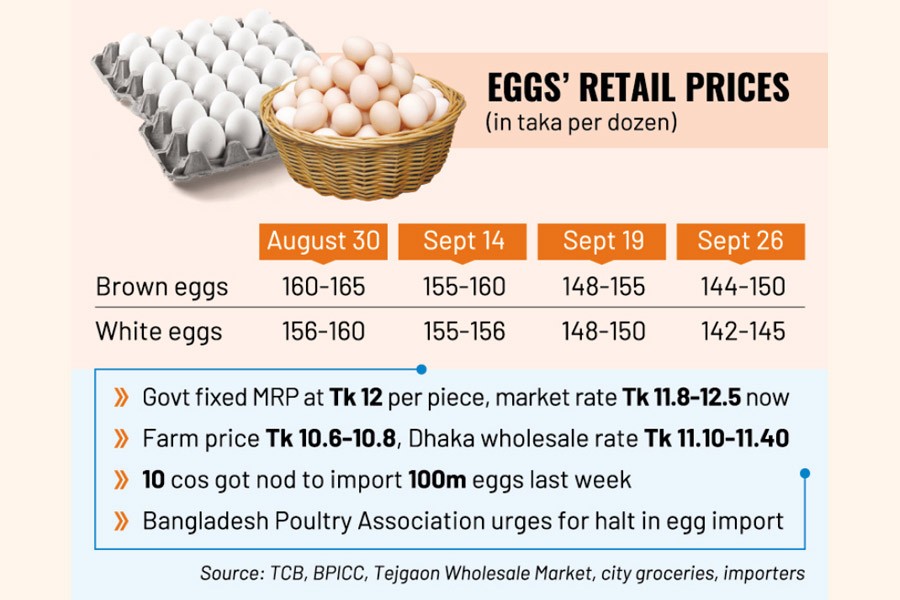Import order works like magic
Egg prices down to government’s MRP
Importers now in game over declining wholesale rates

Published :
Updated :

Egg prices further declined to near the government-fixed MRP (maximum retail price) on Tuesday.
Meanwhile, the declining price at farm level has been raising concern among importers who are in a finger crossed situation over their gains.
Brown farm egg (non-branded) was retailed at Tk 144-150 a dozen or Tk 12-12.5 apiece, white farm egg at Tk 11.8-12.0 apiece in most city areas the same day, according to groceries.
Mubarak Hossain Jibon, a grocer at Katasur in Mohammadpur, said representatives of Tejgaon wholesale outlet gave them brown egg at Tk 11.40 apiece on the day, which was Tk 11.80 two days back.
Meanwhile, farm price dropped 0.3-0.5 apiece further in a week reaching Tk 10.6-10.8 a piece, according to the Bangladesh Poultry Industries Central Council (BPICC).
The declining started with the government approval to ten companies to import 100 million pieces of eggs from the global sources amid the rocketing trend of the essential in the domestic market.
Egg prices reached a record Tk 180 a dozen or Tk 15 apiece in mid-August.
The Directorate General of National Consumer Rights Protection (DSNCRP) started market drives following the unprecedented hike while it also meet all players of the market at its office to resolve the issue.
Later the ministry of fisheries and livestock suggested for an MRP of Tk 12 per piece egg.
The market drives helped a little bit as prices declined slightly to Tk 155-160 a dozen later.
However, the commerce ministry, as recommended by the DNCRP, fixed MRP of egg officially at Tk 12 apiece on September 14 when the MRP was Tk 13.3-13.5 apiece.
On September 17, the ministry permitted four companies to import 40 million pieces of eggs. Another six companies got approval further to bring 60 million eggs, according to the ministry.
The importers were enthusiastic to bring eggs at Tk 9.0 apiece from India and consumers could get it at maximum Tk 10.
The Consumers Association of Bangladesh (CAB) has also urged the government to fix an MRP of imported eggs at Tk 10.
But the situation has been different for importers amid rising prices in India as well as the declining farm-level prices in the domestic market.
Zakir Hossain, owner of Cheese Gallery that got permission to bring 10-million eggs, said prices in West Bengal increased to Tk 7.0-7.5 marking a 20-25 per cent hike in two weeks.
Import cost would be Tk 9.45-9.60 apiece now if the current price exists, he added.
"We've a target to make Tk 0.2-0.3 apiece profit and sell them to city wholesalers so that the consumers could get it at minimum rate."
A further hike by Tk 0.5-0.6 apiece in India might cause us troubles following declining prices in the domestic market, said Mr Hossain.
However, most companies were yet to start import.
Saifur Rahman, proprietor of Tiger Trading, said: "After getting the NOC from the Office of the Chief Controller of Imports and Exports, we'll have to collect performa invoice (PI) from exporter companies and then could get draft for opening L/Cs."
The process would waste some additional days, he said, adding that nobody could bring egg before next Sunday.
Meanwhile, Bangladesh Poultry Association, a platform of poultry farmers, at a meeting on Tuesday demanded an end to egg import to safeguard 5.0-6.0 million people of the sector.
At a press conference at Dhaka Reporters Unity, BPA president Sumon Howladar said 80 per cent of the egg demand is met by marginal farmers.
Importing eggs could not break the syndicate which is responsible for the volatility, he added.
Bangladesh is self-sufficient in egg and chicken production, said Mr Howladar, claiming that local egg production is currently 50-million pieces against a demand for 40 million.
"Some 5.0-6.0 million entrepreneurs are directly and indirectly involved in the poultry industry. Import of eggs should be stopped to protect employment and protect marginal farmers from losses. By reducing the cost of poultry feed and chicks, the cost of production could be reduced."
CAB secretary Humayun Kabir Bhuiyan said the strategic import should be continued to control over the market.
Limited imports could hardly affect local farmers, rather it would help consumers who are already in hardship for higher prices of essentials, he added.
tonmoy.wardad@gmail.com


 For all latest news, follow The Financial Express Google News channel.
For all latest news, follow The Financial Express Google News channel.